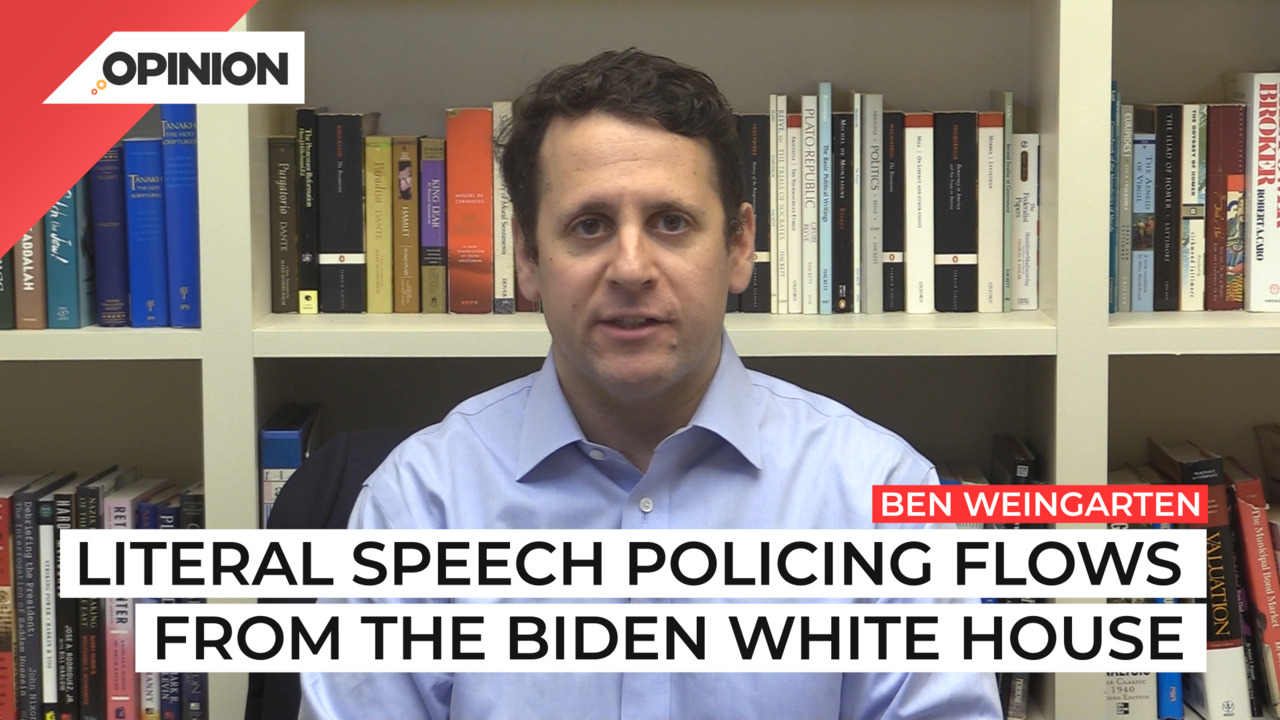
Commentary
-
Our commentary partners will help you reach your own conclusions on complex topics.
For months we’ve been covering what we consider one of the most chilling developments in American life: The hyper-politicization and weaponization of the national security and law enforcement apparatus, its brazen targeting of wrongthinkers, and with it, its assault on our most basic rights.
Now comes extensive proof this effort is both accelerating, and likely already far more advanced than most were aware. The progressive publication The Intercept reports that as we predicted at the time, despite the DHS’s shuttering of the DGB, “Disinformation Governance Board,” the security state’s speech policing is only expanding.
According to The Intercept:
- The DHS plans to target, per a draft copy of its Quadrennial Homeland Security Review, “inaccurate information” on, “the origins of the COVID-19 pandemic and the efficacy of COVID-19 vaccines, racial justice, U.S. withdrawal from Afghanistan, and the nature of U.S. support to Ukraine.”
- While “counterterrorism” remains the first and most important mission of the Department,” that document reads, DHS’s “work on these missions is evolving and dynamic” and must adapt to terror threats “exacerbated by misinformation and disinformation spread online” including by “domestic violent extremists.”
This from an agency created to counter jihadists after the September 11th attacks – not meme-makers on Twitter.
Per an August DHS inspector general report, sub-agencies like Customs and Border Protection, Immigrations and Customs Enforcement, the Science and Technology Directorate, along with the Secret Service, have all expanded their mandates to root out “disinformation.” Government officials have been flagging content on Facebook and Instagram and requesting that it be suppressed via a special portal requiring a government or law enforcement email to use. And according to documents The Intercept reviewed, agencies are planning to take far more aggressive roles to engage in the information space, even seeking to prebunk or debunk trends they disagree with, and increase measures to stop the “spread of false and misleading information” – particularly that which undermines key democratic institutions – at least per the urgings of one DHS advisory committee. Says Jen Easterly, President Biden’s Director of DHS’s Cybersecurity and Infrastructure Security Agency – which has used its mandate to protect critical national infrastructure, including around elections, to justify its speech police-related activity, quote:
“One could argue we’re in the business of critical infrastructure, and the most critical infrastructure is our cognitive infrastructure, so building that resilience to misinformation and disinformation, I think, is incredibly important.”
See, *everything* really is infrastructure – including your brain.
And all of this on top of the continued meetings that started during the 2020 election season between Big Tech and other major companies and various government agencies, to discuss “content moderation” – which led to the flagging of thousands of items by at least one partnership coordinating these efforts, and the removal, labeling or soft-blocking of a substantial portion of that content. This is to say nothing of course of the Hunter Biden laptop suppression in the throes of that election.
There are so many things wrong with these efforts, it’s hard to know where to begin. You have the government working hand-in-glove with putatively private industry to silence those who disagree with it. You have it doing so on grounds that speech it disagrees with on subjective, highly-contentious issues, demanding robust debate – the exact kinds of speech the First Amendment exists to protect – is dangerous, if not terroristic. How many times has what has been cast as misinformation and disinformation, ultimately proven settled science in just the last couple years?
You have the government shifting its resources from combatting enemies abroad to wrongthinking Americans at home, surveilling them on social media. And then of course you have the push from monitoring content to flagging it, and pressing social media companies to purge it. Literal speech policing. Much of this, as I’ve noted again and again, flows from the Biden administration’s National Strategy for Countering Domestic Terrorism. The fourth pillar of that document on “confront[ing] long-term contributors to domestic terrorism” suggests that the Biden administration has quote:
“A broader priority: enhancing faith in government and addressing the extreme polarization fueled by a crisis of disinformation and misinformation. We will work toward finding ways to counter the influence and impact of dangerous conspiracy theories that can provide a gateway to terrorist violence.”
The premises here are all wrong. The way a government earns our trust – our faith in it – is through honoring the law, dutifully serving the people, and holding itself accountable, mercilessly so, when it errs. Governments earn trust by encouraging critical discourse, particularly on the most fraught issues, led by government conduct, welcoming scrutiny, skepticism, and challenges. Let the best critiques win. Let the strongest ideas prevail.
When governments do the opposite, of course – suppressing competing voices and covering up misconduct – they encourage conspiracy theory. They fuel unrest. They undermine our republican system and create volatility in it. The effort to “protect” people from speech leads to the destruction of the very principles on which our whole system relies.
Neither Joe Biden nor Mark Zuckerberg are arbiters of truth, nor should they be policing it. Give them a monopoly on those powers and you have a tyranny. Yet they seem to want to usurp those powers, and that Elon Musk is under such withering criticism because he might relinquish them at Twitter, tells you all you need to know about the disingenuous nature of this effort to link anti-establishment thoughts to danger to violence and demand this whole-of-ruling class crackdown on it.
We need power to the people, not those seeking to silence us.
-
‘Deep State’ failed to protect Trump
The stated mission of the United States Secret Service is to “ensure the safety and security of our protectees.” However, on July 13 in Butler, Pennsylvania, the Secret Service allowed a lone would-be assassin to fire a shot at former President Donald Trump, grazing his ear with a bullet. Secret Service Director Kimberly Cheatle resigned…
-
The Regime once again meddling in election to hurt Trump
On Tuesday, July 9, the U.S. Department of Justice issued a cybersecurity advisory warning companies about a Russian social media bot farm. U.S. officials told reporters that these Russian bots are targeting U.S. voter groups in key swing states and implied that the goal is to undermine President Joe Biden. Watch the above video as…
-
Clarence Thomas has it right on presidential immunity case
On July 1, the United States Supreme Court ruled in a 6-3 majority opinion for Trump v. United States that American presidents have absolute immunity from prosecution for actions that fall within their constitutional duties. The ruling asserts that evidence of official criminal acts committed by a president cannot even be presented in any U.S.…
-
SCOTUS’ Murthy v. Missouri ruling will live in infamy
On June 26, the U.S. Supreme Court sided with the federal government in the Murthy v. Missouri case regarding official communications between the government and social media platforms. In a 6-3 decision written by Justice Amy Coney Barrett, the court stated that the plaintiffs did not have the legal standing to seek an injunction against…
-
Anti-Trumpers care about power, not democracy
News commentators across the political spectrum — including some contributors here at Straight Arrow News — have warned Americans about Donald Trump’s aspirations to make himself a dictator and effectively end the American republic if he regains power in November. Their warnings cite Trump’s own legal arguments, public statements and past behavior, including the attempted…
Latest Opinions
-
 U.S. Department of Defense
U.S. Department of Defense
Congress still trying to figure out how to reduce wasteful military spending
-
 DVIDS
DVIDS
US Navy, Air Force making waves with new weapons at RIMPAC
-
 Getty Images
Getty Images
Israeli PM Netanyahu meets with Trump at Mar-a-Lago
-
 Getty Images
Getty Images
Growing US nuclear power resurgence reaches the nation’s heartland
-
 Getty Images
Getty Images
Beer from the sun, other solar thermal projects get government funding
Popular Opinions
-
In addition to the facts, we believe it’s vital to hear perspectives from all sides of the political spectrum.


